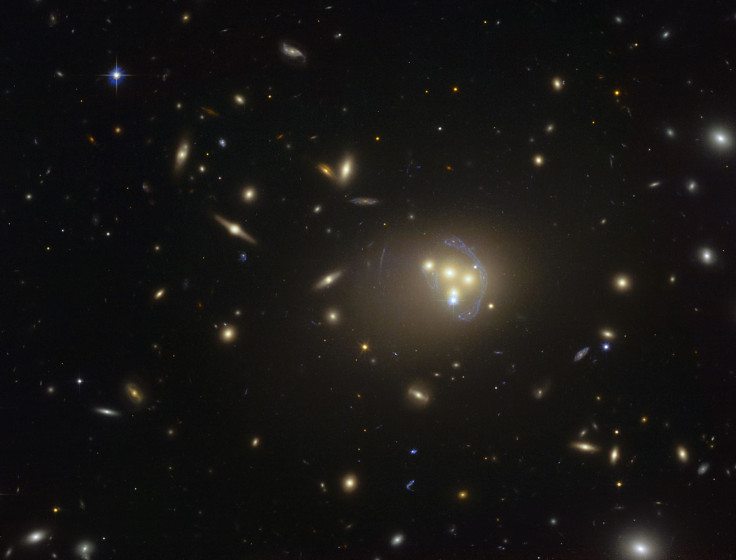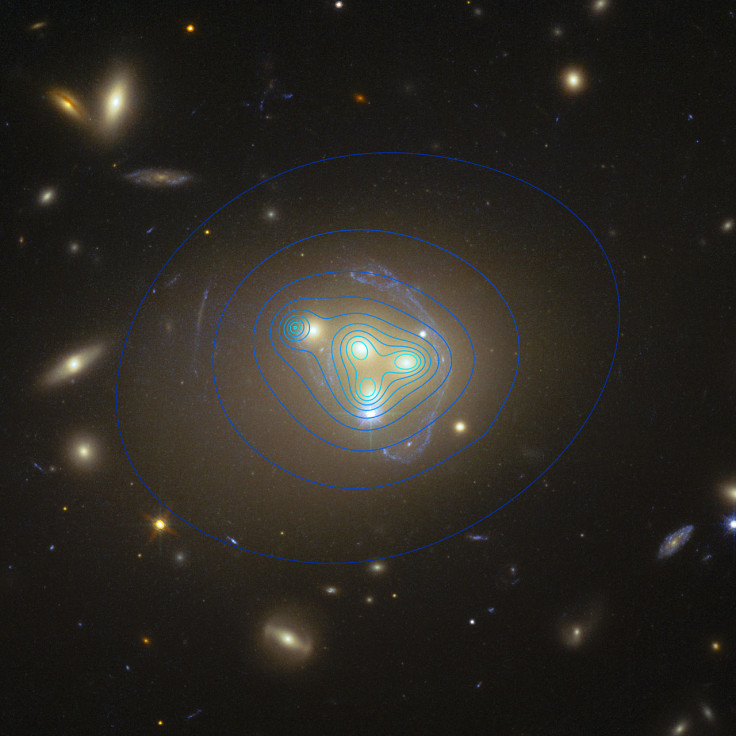Interacting dark matter potentially observed for first time ever in colliding galaxies

For the first time, scientists might have discovered dark matter interacting with other dark matter – a find that would, if confirmed, open up a completely new realm of physics.
Researchers have observed a set of four galaxies colliding around 1.4 billion light years away using ESO's Very Large Telescope (VLT) and Nasa's Hubble.
Published in the Monthly Notices of the Royal Astronomical Society, the team studied the simultaneous collisions of four galaxies in the galaxy cluster Abell 3827. Researchers were able to trace where mass lies in the system and compare it to the distribution of the dark matter through the luminous galaxies.
Currently, scientists believe that galaxies exist inside clumps of dark matter. Without its gravity, galaxies would be flung apart as they rotate – but its true nature remains a mystery.
In the galaxy collision studied, one clump of dark matter appeared to lag behind the galaxy it surrounds. A lag between dark matter and its associated galaxy would happen if the dark matter is interacting – even very slightly – with itself. Before now, dark matter has never been observed interacting with anything other than the force of gravity.
Lead author Richard Massey said: "We used to think that dark matter just sits around, minding its own business, except for its gravitational pull. But if dark matter were being slowed down during this collision, it could be the first evidence for rich physics in the dark sector — the hidden Universe all around us."
David Harvey, Ecole Polytechnique F´ed´erale de Lausanne, an author on the study, told IBTimes UK that the results are tentative, but exciting.
Harvey was lead author on a recently released paper that looked at 30 galaxy cluster collisions. Galaxy clusters are collections of hundreds of galaxies, far larger than the four studied. In his paper, he found that dark matter does not appear to interact with itself.

Speaking about the latest study, Harvey said that individual galaxy collisions are far slower than galaxy cluster collisions, meaning it has more time to interact.
However, he said it is an interpretation of what they saw: "This is just one object and it's only been seen in this one time. And it's hard to base concrete conclusions off just one single object.
"The problem with looking at one individual object is that there may be unknown unknowns that we haven't thought about, so there may be for example weak gravitational lensing – strong gravitational lensing is what you use to look at where dark matter is. It looks at all of the matter along the line of site between the very distant galaxy and you. There may be bits in between, behind or in front of that galaxy that causes the signal to change. There are lots of things that may impact the result when you only look at one data point."
To truly say they have found interacting matter, scientists will need to find another case of these colliding galaxies – which is what the team is planning to do next: "If that prediction comes true you can start to make concrete profound statements about what dark matter is doing," said Harvey.
Should they find another case, however, the implications are massive: "It's very exciting, it's potentially very big. For one it would be the first ever confirmed interactions that aren't via gravity. The first time we've seen particle properties of dark matter, which would be huge because it would start to confirm all sorts of things," said Harvey.
"We could start being more concrete – we could say we can now find dark matter instead of saying we can hope to find dark matter. Also we know there is some unknown physics out there that we don't know about so, it would open a completely new realm of physics to what we know.
"There would potentially be this new family of particles that we just didn't know about, which would be very exciting. But at the same time I don't want to get too carried away with tentative results – it's an interpretation of an observation."
© Copyright IBTimes 2025. All rights reserved.






















